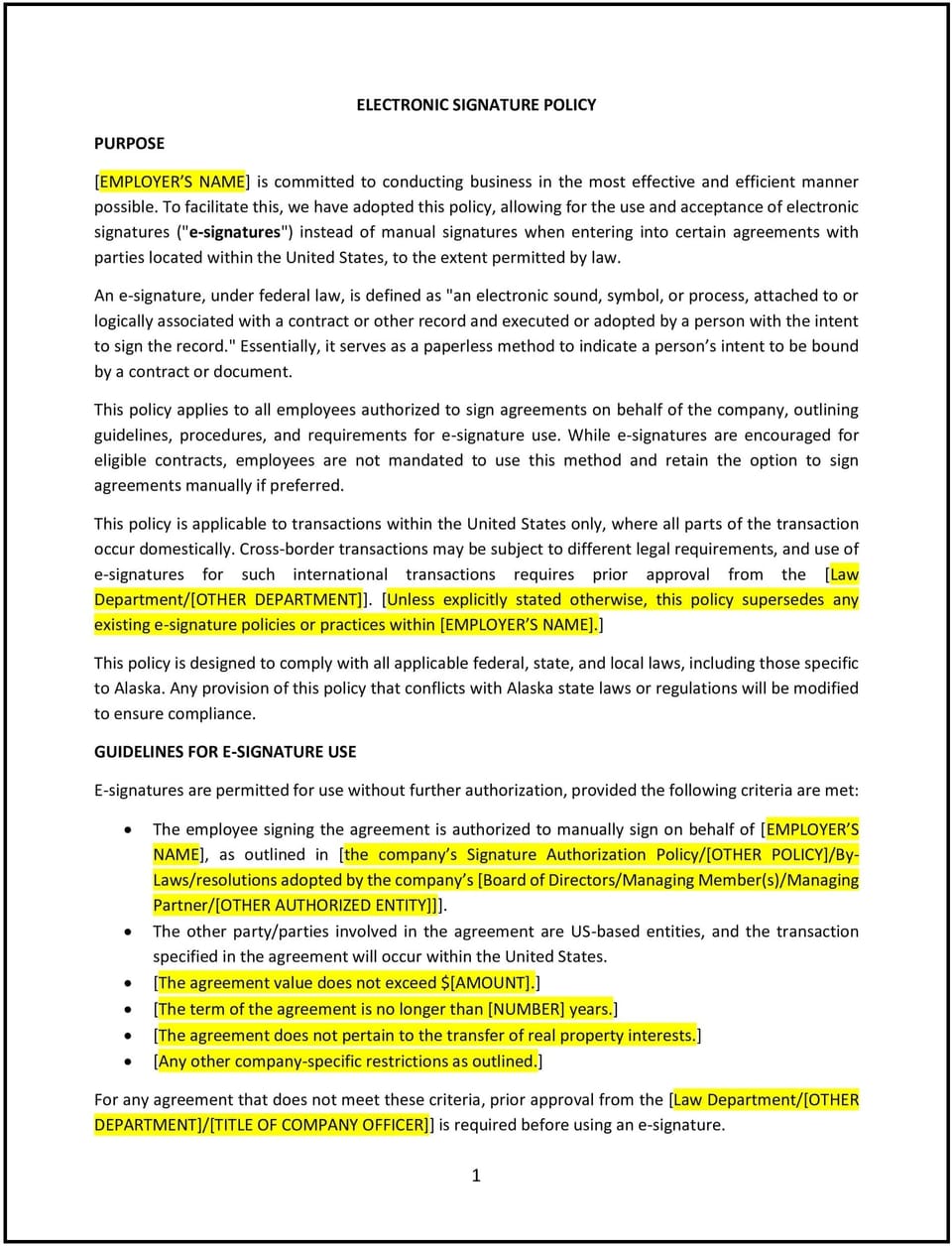Electronic signature policy (Alaska): Free template

Electronic signature policy (Alaska)
In Alaska, an electronic signature policy outlines the procedures and requirements for using electronic signatures in business transactions and internal operations. This policy ensures that electronic signatures are legally valid, secure, and consistently applied across the organization. By implementing an electronic signature policy, businesses can streamline workflows, enhance efficiency, and support compliance with state and federal regulations.
Given Alaska’s remote workforce and unique industries, such as resource extraction and tourism, electronic signatures can be especially valuable for facilitating quick and reliable document execution in diverse and often geographically dispersed settings.
How to use this electronic signature policy (Alaska)
- Define acceptable use: Specify the types of documents and transactions where electronic signatures are permitted, such as contracts, agreements, or internal approvals.
- Ensure legal compliance: Establish guidelines that align with Alaska’s Uniform Electronic Transactions Act (UETA) and federal laws like the ESIGN Act to ensure electronic signatures are legally valid.
- Outline security measures: Include requirements for verifying signer identity, protecting document integrity, and securely storing electronically signed records.
- Set technology standards: Identify approved electronic signature platforms or software to ensure consistency and compliance with security standards.
- Provide employee training: Educate employees on the proper use of electronic signatures and the importance of following company guidelines.
Benefits of using an electronic signature policy (Alaska)
An electronic signature policy provides several advantages for businesses in Alaska. Here’s how it helps:
- Enhances efficiency: Speeds up the signing process, reducing delays associated with physical document handling or remote signers.
- Reduces costs: Saves money on printing, mailing, and storage by transitioning to electronic processes.
- Supports compliance: Ensures that electronic signatures meet legal and regulatory requirements, reducing risks of disputes or invalid agreements.
- Improves accessibility: Allows employees and clients in remote locations to execute documents quickly and securely.
- Maintains consistency: Establishes clear guidelines for using electronic signatures, promoting uniform practices across the organization.
Tips for using an electronic signature policy (Alaska)
- Use approved platforms: Ensure employees and partners use secure and compliant electronic signature software to maintain document integrity and validity.
- Verify signer identity: Include steps for verifying signer authenticity, such as multi-factor authentication or government-issued ID checks, for high-stakes agreements.
- Address storage requirements: Specify how signed documents will be securely stored and retained to meet business and regulatory needs.
- Regularly update the policy: Review the policy periodically to reflect changes in laws, technology, or business operations.
- Communicate clearly: Ensure employees and clients understand the scope and limitations of electronic signatures to build trust and minimize errors.
Q: Are electronic signatures legally valid in Alaska?
A: Yes, electronic signatures are legally valid under Alaska’s Uniform Electronic Transactions Act (UETA) and the federal ESIGN Act, provided they meet certain criteria.
Q: What types of documents can be signed electronically?
A: Most business documents, such as contracts, agreements, and approvals, can be signed electronically, except for documents excluded under UETA or other regulations.
Q: How can businesses ensure the security of electronic signatures?
A: Use secure platforms, require identity verification, and employ encryption to protect the integrity of electronically signed documents.
Q: What are the benefits of using electronic signatures for remote teams?
A: Electronic signatures allow remote employees or clients to sign documents quickly and securely, reducing delays and improving collaboration.
Q: How often should this policy be reviewed?
A: Review the policy annually or whenever there are significant changes in laws, technology, or business needs.
This article contains general legal information and does not contain legal advice. Cobrief is not a law firm or a substitute for an attorney or law firm. The law is complex and changes often. For legal advice, please ask a lawyer.


